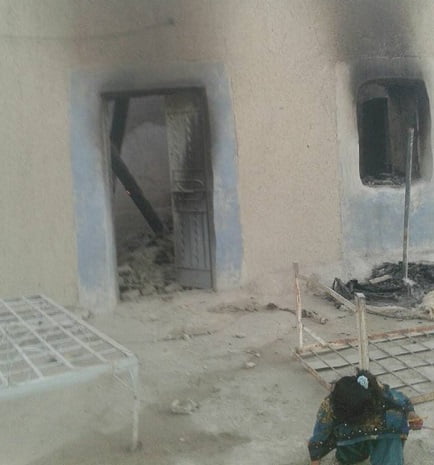Qazi Ali Murad, who himself doesn’t know exactly why people call him Qazi, is a livestock farmer and he has a guest for lunch today (Wednesday). So, according to Baloch traditions, he slaughters a goat and gives its meat to his wife to make lunch for the guest.
While his wife is cooking, arrives around a dozen military vehicles. As they stop, some soldiers rush into the house and arrest Qazi Ali Murad and his guest. They are handcuffed, blindfolded and put into one of the vehicles. Some other soldiers order the women to get out of the house.
As the women rush out, one soldier throw some “liquid” over the walls and the floor and throws a burning matchstick while running backwards to avoid the blazing fire.
They wait for a few minutes outside the burning house, starting at the leaping flames, till the mud house is burnt into ashes. Then they move away along with Qazi Ali Murad and his unsuspecting guest.
But they don’t go very far. They stop at another house in Qazi e Metag (the village of Qazi), which is home to 10 to 12 livestock farmers’ families. The soldiers burn all the 10 to 12 homes of the village one by one and arrest every adult man they can get their hands on.
And then they move to another small village called Mohammed Hayat e Metag (the village of Mohammed Hayat), which neighbours Qazi e Metag and along with another such small village is part of a relatively larger area called Najjoo.
Najjoo is surrounded by mountains where Baloch separatist militants are waging a war against the Pakistan military for an independent Baloch state.
The soldiers burn all the 25-30 houses in Najjoo’s three small villages to punish the residents for failing to provide them with information about the militants.
Apart from Qazi Ali Murad, the soldiers also took away Rustum son of Mohammad Hayat, Qamar-ud-Din son of Mohammad Hayat. Lakkad son of Dost Mohammad and Allah Baksh from Najjoo’s three tiny villages.
Najjoo is part of Mashkay, the hometown of Dr Allah Nazar, who is leading the separatist militant movement. A day earlier, on Monday, the army had pasted posters on walls across Mashkay with photos of Dr Allah Nazar and other militants, announcing a head money for information about his whereabouts or handing him over to the military, dead or alive.
But burning of houses is not limited to Dr Allah Nazar’s area. On November 15, a dozen military vehicles broke into a compound which is home to the late Baloch leader Ghulam Mohammad and his relatives’s houses in Mand, a town bordering Iran. They burnt 12 mud houses in the compound.
Ghulam Mohammad was a popular Baloch leader and founder of the Baloch National Movement. He was whisked away by military personnel on April 3, 2009 from his lawyer’s office in Turbat, where he was in consultation about the cases pending against him after an appearance in a court earlier in the day. In the early hours of April 9, his bullet-riddles body was handed over to his family by the Turbat administration.
How can you punish a man whom you killed seven years ago?
But some military vehicles might be on their way right now to burn another village to punish its residents for some reason.
Sajid Hussain (1981-2020) was a writer and senior journalist from Balochistan. He had a degree in Economics, International Relations and English Literature from Karachi University. He had the experience of working with Pakistani newspapers Daily Times and The News International. Sajid Hussain was also the founding editor of this online magazine.



